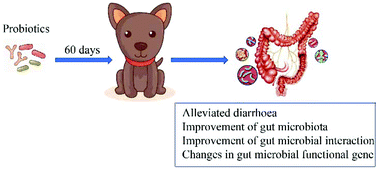Metagenomic analysis revealed beneficial effects of probiotics in improving the composition and function of the gut microbiota in dogs with diarrhoea
Abstract
The aim of the present study was to evaluate the effects of probiotics on the composition and function of the gut microbiota in dogs with diarrhoea. Forty dogs with diarrhoea were randomly allocated to the treatment group or control group. Probiotics, containing Lactobacillus casei Zhang, Lactobacillus plantarum P-8, and Bifidobacterium animalis subsp. lactis V9, were only fed to 20 treated dogs for 60 days. The faecal samples of all dogs at day 0 and day 60 were analyzed using a metagenomic approach. The results showed a significantly higher microbial diversity and an obvious change in the structure of the gut microbiota in the treatment group. There was also an increase in the abundance of some beneficial bacteria in differently aged dogs, such as Lactobacillus johnsonii (P < 0.05), Lactobacillus reuteri (P < 0.01), Lactobacillus acidophilus (P < 0.05) and Butyricicoccus pullicaecorum (P < 0.05), and a reduction in the abundance of many opportunistic pathogenic bacteria such as Clostridium perfringens (P < 0.05) and Stenotrophomonas maltophilia (P < 0.05) with the supplementation of probiotics. Intriguingly, the correlated networks among some pathogenic bacteria decreased following the administration of probiotics. Additionally, metagenomic analysis revealed the upregulation of pathways involved in the metabolism of amino acids and biosynthesis of secondary metabolites, accompanied by the downregulation of pathways associated with virulence of pathogenic bacteria and cell signaling, suggesting that probiotics could improve the health of dogs with diarrhoea through regulation of the gut microbiota. Our research provides new information relevant to the treatment of diarrhoea in animals and humans.



 Please wait while we load your content...
Please wait while we load your content...